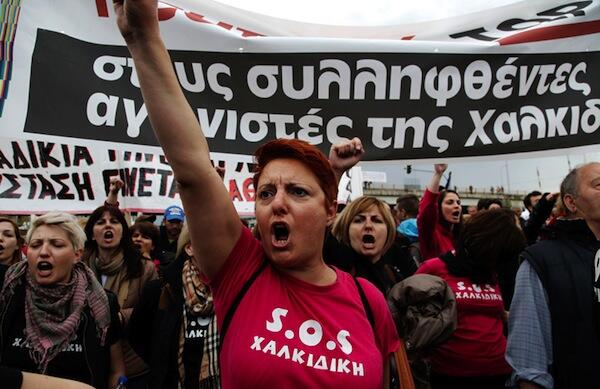
In December 2011 Swiss financial journalist Myret Zaki asked a group of economists a simple question, “Why now? For example, you have all noticed that suddenly Greece was in crisis”. She noted that it was not because of Greece’s public debt, which had been fairly stable and not especially large. The economists mentioned Goldman Sachs, which had advised the Greek government to sell its financial products and then informed their own clients and friends about Greece’s “financial weakness”. Myret Zaki completed the picture with the story of the 2010 Soros Dinner, when a few hedge funds managers cooked up an attack on the Euro through Greece. The Wall Street Journal report on the dinner quoted Hans Hufschmid, a hedge-fund administrator (GlobeOp Financial Services SA), in London and New York: “This is an opportunity…to make a lot of money.”
We all know what happened next. We remember the demonstrations and how these speculators precipitated the demise of employees, citizens who were to pay for their financial coup. As France’s General Commissioner for Public Investment René Ricol explained, “This is a combat between the world of finance, the world who wants to make a lot of money very quickly, and the world of `true life’”. With the support of neoliberal doctrine, the world of finance has subsumed civil society.
But that was then.
Today, in Greece the world of “true life” has reorganized after the shock of the financial attack that sent many into poverty and precariousness. Taken by surprise, people believed at first that the country had overspent its revenues; now they know that overspending was not the problem.
The recent documentary, Canaries In the Coal Mine, shows how the State is controlling the revolt and the fight for reestablishing the democratic civil society values. This story should be understood as “a lot more than Greece’s tragedy.”
Greek trade unionists defending steel workers who were not paid during 18 months were sent to court, accused of terrorism for organizing demonstrations and for showing workers’ frustration. As prosecutions of heads of associations representing workers, immigrants, and others demonstrate, anti terrorist laws have been used to install a general surveillance of “true life” populations, producing the legal tools to choke any contestation.
The criminalization of Greece’s social movements has been generalized. The documentary makes it clear Greece is in Europe. Across Europe, many are being threatened by the same shock of the unfettered and ferocious financial powers. Everyone who fights for rights is in danger, according to Oliver Stein (Progress Lawyers Network) and Pierre Arnaud Perrouty (Human Rights League, Belgium): “The ones who carry the contestation protect the rights of us all…. They are the canaries in the coal mine”. Once the canaries are smothered, everyone will feel the blast.
Last week, Moodys upgraded its rating of Greece by two points. Why? “The Greek economy is bottoming out after nearly six years of recession”. Greece underwent appropriate structural reforms.
Yes, thanks to an artificially engineered recession, the Greeks touched bottom. That is not a positive sign!
Sofia Tzitzikou, who runs a community clinic in Athens, knows “the bottom” well. Greeks, who had a very effective health-care system until the “crisis”, lost their social security. Almost 50% of the population does not have access to social security, to health care. Women have been particularly affected as their reproductive rights are compromised, since women now have to pay for these services.
Sofia explains that the role of the community clinics is not to substitute for the public services that are the State’s responsibility. But people are suffering and dying, and so solidarity is indispensable. She explains that this engagement is also political work. Clinic workers explain to their patients that they have to get involved as well to revive and counter the structural reforms prescribed by the Troika (European Commission, IMF, European Central Bank).
“In Greece we have a systematic infringement on human rights, social rights, workers’ rights, on democratic rule of law, on the welfare state” declares Zoe Konstantopoulou, a representative at the parliament.
Canaries in the Coal Mine captures the aftermath of the neoliberal financial shock on “true life.” It debunks the construction of a crisis that is actually an experiment in controlling civil society for financial benefits for the few. That’s what happened in Greece, which, not that long ago, was one of the top 20 economies. Sofia explains that right now, in Greece, democracy is absent. Democracy is to serve people for the improvement of people’s lives, not the opposite. The documentary opens and ends with music by Greek rap artist Paulos Fyssas, assassinated in Athens by a Golden Dawn fascist activist.
What happened in Greece is possible anywhere. Only solidarity, in particular European solidarity, and true democratic resilience might counter this brutal attack on civil society. We should listen carefully to Athenian student Melanie Mavrogiorgi: “We don’t have the army in the government to control us. So we have hope as we see people still demonstrating. They are still hunting and fighting for their rights. I think that is a piece of democracy.”
The documentary ends: “Pay attention to the canaries in the coal mine. They warn us of the dangerous gas that neoliberal politics wants to blow up. It is time to get out of the mine!” The documentary ends; the struggle continues.
(Photo Credit: Twitter / 15M Barcelona) (Video Credit: Yannick Bovy / YouTube)